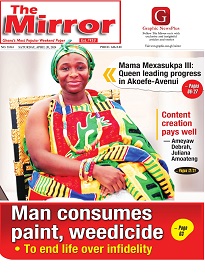The Mirror's Health , Lifestyle and Fashion

Journey to the other world; What are the traditional ‘prospectus’?
In Ghana, each ethnic group has different ways of bidding farewell to the departed.
Advertisement
Just like naming a new baby and marriage, the rites performed after a person dies are based on the customs of the people.
Most ethnic groups consider the age of the deceased, status in society, cause of death and how he or she lived her life.
With exception of people who are cremated or buried soon after death, in accordance to their religious beliefs, the dead are usually buried with items.
After setting the date for the funeral rites, elders in the family provide a list of burial items.
These items depend on the family’s customs.

As part of a series of articles on funeral rites in Ghana, this reporter earlier this week interacted with some vendors of burial items at the Makola Market in Accra and they explained what goes into selecting particular items.
Seventy-two-year-old Madam Victoria Lamptey (popularly known as Sister Kai) has sold burial items for over 10 years now.
She told The Mirror that she took over her mother’s business when her (mother) suffered a stroke before her death.
Being the only girl out of the nine children her late mother had, she had to step in when her mother was hospitalised.
She said it was not difficult to adapt to her new business as her mother had sold those items all her life.
“Prior to selling these items, I sold fruits in large quantities but I knew a lot about the items because I helped my mother most of the time before she passed away,” she stated.
Life after death
Sister Kai said most families believed in life after death and that was why the dead were buried with items.
She sells mats (woven and plastic), pillows, blankets, towels, combs, creams, powder, beads, “Florida water” and mirrors.
She also sells cloths, traditional sponges, handkerchiefs, rings and dresses.

She said it was believed that a place existed after death and so those items were to help facilitate the journey of the dead or transition into the next world.
While some of her customers knew what they wanted, others also deepened on her to choose the appropriate items, she explained.
For the later, she enquired about the ethnicity, age and gender before choosing the items.
Although most Ga and Akan she attended to bought similar items such as cloths, pillows, blankets, towels, combs, creams, gloves, powder, “Florida water” and mirrors, there were also some differences.
For instance, with the traditional sponge, the Ga purchased “Taakotsa” while the Akan used the “Bosa” and “Ahensa”.
The Akan use the woven mats while the Ga use the plastic mats.
“In addition to these items, some old clothes, including the one last worn by the person before he or she died, are neatly washed and placed into the coffin. I also know they add seven pieces of unused cloths too,” she added.
She admitted that though most of the items were placed in the coffin, others were also shared among elders in the family.
Items such as bars of soap, buckets, basins, creams, and mirror are not placed in the coffin.

The Ga call this “Bue” or “t kl ” while the Akan call it “Amonsen”. It is a piece of cloth that is strung around the groin of the deceased. The yellow is used for men and red for women
Sister Kai said there had been many instances when people, usually children of a deceased person, had come to her to buy a new set of items following a rejection of earlier items purchased.
She admitted that in some instances, those families were just being quarrelsome or putting the children under stress but in other instances, the items presented earlier were inferior.
“Each family has what they look out for and so if you buy them without proper consultation, they will be rejected. There are many vendors who will push their items to you just because they want to make money,” she noted.
Just before this reporter left Sister Kai’s spot, a young man who had lost his father asked her for help as the items he had purchased earlier had been rejected by his family.
With GH¢450, Sister Kai gave him a bag full of all the items he will need to please his “difficult” family while assuring him that this time, they will have no reason to reject them.
Accessories
Naa Borteley also sells beads and other jewellery for traditional ceremonies but her shop is also popular for the sale of jewellery and beads used to bury the dead.
She told this reporter that the type of jewellery or beads used depended on the tribe, age and status of the person.
For instance, if the deceased was a twin, they bought white beads or white jewellery.

The choice of ornaments depend on the family’s beliefs and preferences
Some families also decide to bury their dead relatives with expensive ornaments used by chiefs and queen mothers.
“There are many ornaments and this largely depends on the family’s beliefs and preferences. People spend as much as GH¢10,000 on ornaments only but there are others sold at GH¢20,” she explained.
Learning about burial rites may appear morbid but death is part of life and once it hits close to home, you must be prepared to send your departed off in a befitting way according to your customs.
Look out for articles on funeral rites in The Mirror in the coming weeks.





